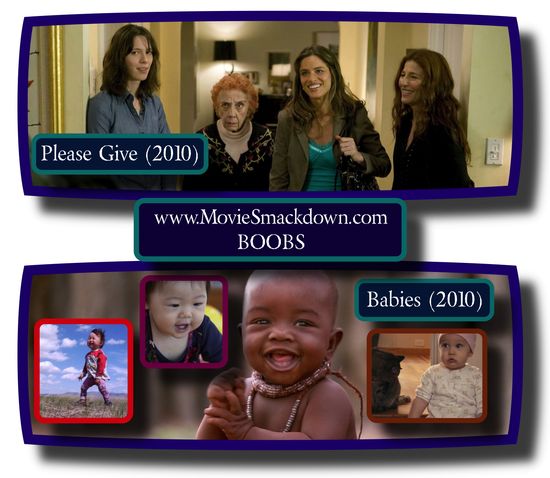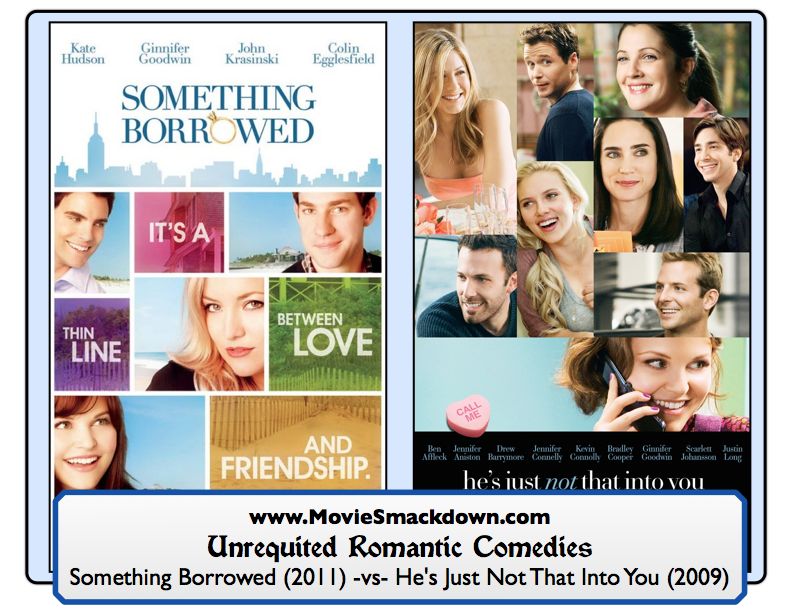
 The Smackdown
The Smackdown
Women’s breasts appear in a lot of movies. A lot. Usually, they’re gratuitous. Gratuitous, pneumatically enhanced and phony, fetishized dangling orbs meant to entice, designed for ogling. There. I’ve got your attention and I didn’t even have to unbutton my blouse. The breasts featured prominently in these two Smackdown contenders are all real and as far from exploitation as one could imagine. In the startling opening frames of “Please Give,” a series of disembodied, wordless and vulnerable milk glands get gently slapped, manipulated, and arranged under the harshest fluorescents. Readied for their respective mammograms, these random fleshy bundles of ducts and veins and possible disease are hardly ready for their decisively, definitively, defiantly unglamorous close-ups, and the tone is set. The bar is raised. In the remarkable French documentary “Babies,” mothers’ breasts appear frequently and utterly without the usual fanfare and sexual context. We’re on sacred ground, people. These movies weren’t made for teenage boys and the arrested men they’re destined to become. These films celebrate the human condition with honesty, integrity and very rare courage indeed.
[singlepic id=322 w=320 h=240 float=right]
In This Corner
Nicole Holofcener weaves an unpredictable tapestry of overlapping urban lives starring her usual Doppelganger Catherine Keener in an unusual role – the sympathetic center, the heart and head of “Please Give.” Surrounded by a truly impeccable cast of equally terrific actors playing perfectly written roles, all the stories dovetail and carom, defying easy resolution and avoiding the trite trap of hackneyed life lessons. Imminent death and profound loss hover around the proceedings, balanced delicately with laugh-out-loud comedy, fumbling romance, and careless betrayal; the tones shift masterfully and always surprisingly, capturing life in all its weird wonderfulness.
[singlepic id=317 w=320 h=240 float=right]
In That Corner
French documentarian Thomas Balmes filmed a year in the life of four babies – Mongolia’s Bayar, Namibia’s Mari, Tokyo’s Ponijao, and San Francisco’s Hattie. Without narration, the audience watches these transplendant little wonders from birth to their first steps; we are left to marvel at the ways in which we are all the same and to ponder all our societal differences as well. A real crowd- leaser enjoying a mystifyingly wide release, “Babies” is a documentary for people who might never go to the movies to see one.
The Scorecard
Mark my words. Ann (Morgan) Guilbert deserves an Academy Award for her supporting performance. It’s brave and utterly bereft of vanity, touching and funny and true. I’ve loved Ms. Guilbert since she played television’s Millie Helper, the perfect next-door neighbor to the Petries, and now she’s capping her career with her role as Andra, the all-negative all-the-time next-door neighbor from hell. Almost everyone in the film can’t wait for her to die, and everyone in the audience can’t get enough of her. Rebecca Hall plays Andra’s luminously pale and devoted granddaughter beautifully, hauntingly, winningly; in a wickedly Narcissistic turn, Amanda Peet is Andra’s emphatically less devoted and dissolute descendant. Oliver Platt and Catherine Keener are Andra’s long-married neighbors; it’s New York City, and they’ve purchased her apartment with intentions to expand their own. Sarah Steele plays their painfully real fifteen-year-old daughter. The always-lovely Lois Smith plays matchmaker, mammography patient, and even apotential friend for Andra. I mention all the actors’ names because they deserve mentioning. They’re uniformly wonderful, and with an infinitesimal budget of just three million dollars, I suspect none were paid a fraction of what they’re truly worth.
Holofcener’s writing and directing have never been better, never funnier, never more touching. I laughed, I cried. What more is there to say? Plenty actually. She’s a treasure, and it’s heartbreaking (and probably career-and-soul-saving) that studios don’t give her carte blanche after delivering such beautiful films as “Lovely & Amazing” and “Walking and Talking.” No one captures the world of (neurotic) women (Is there another kind?) with more tender accuracy; I defy anyone who’s seen any of her films not to recall them vividly and personally, as if the small moments occurred in their own lives or to people they know. She’s an absolute master of remarkably well-observed, almost imperceptible shifts and currents of complicated familial relationships examined and exhibited with unmatched honesty and wit.
The film looks terrific; the interiors feel lived in and beautifully specific. The exteriors are just as convincing. The eloquent and seamless editing moves us (and the assembled characters) through tonal shifts that might otherwise have easily jarred.
“Babies” is a remarkably simple idea that mostly works. The segments set in Mongolia are particularly dazzling. Bayar’s world is so austere and remote, so filled with danger, apparent solitude and adventure that even a little bath turns into a thrill ride. “You could poke your eye out with that thing!” my inner mom was screaming. The vistas were remarkable, every bit as cinematic and memorable as anything from David Lean’s “Lawrence of Arabia.”
Namibia’s Mari was a bundle of energy lit from within with an unquenchable life force from the moment of her birth, nurtured effortlessly and without much ado by her mother. For every mother who’s ever boiled a dropped pacifier, Mari’s first year and her mother’s non-interference will prove a gut- clenching revelation.
Unfortunately for the film, the urban environments of Tokyo and San Francisco were so similar as to seem almost redundant. But these are quibbles. There are delights to be had, watching these most vulnerable of our species becoming aware and alert and upright and mobile while challenging every conceivable ethnocentric assumption. As a hugely devoted fan of Great Britain’s “7 Up” series of documentaries, I dare to hope Balmes will check back again after some time has elapsed, but that’s probably not his mission. Over the end credits, we see the four babies in present day; there are some stunning surprises in store for the alert filmgoer.
The Decision
“Babies” works its quiet and raucous wonders and it’s an enterprise well worth your time and money. “Please Give”will prove much harder to find; its release is slow and not at all wide. That said, it also happens to be absolutely brilliant. Please go.




Sarcasm indeed. And no, it was not necessary. It was glib and I take it back. Mostly.
I agree. Us guys have to stick together. And I’ve never been arrested. (technically)
Was this neccessary: “These movies weren’t made for teenage boys and the arrested men they’re destined to become.”? That is a hell of a leap there that you took. I’m hoping this is some form of sarcasm.
Other than that quip, I’ve found your smackdown to be insightful, so much so I am going to have to watch both films.
How was my grammar?
I didn’t exactly give grades…I indicated my preference. But now that you mention it, Brian, I’d give “Babies” a solid B+ while “Please Give” would go to the head of the class with a well-deserved A. It might even win valedictorian, and I’d love to hear its commencement speech.
I have seen both movies. I think Babies might deserve a slightly higher grade than you gave it, but Please Give was wonderful. I have watched some older people pass over the last few years, and the impact of it doesn’t go away. Please Give captured that and put it into a family drama and rattled my cage. Nice reviews.